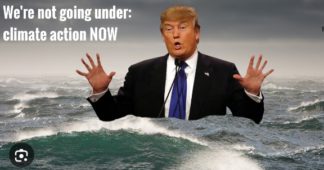Trump administration plans for oil deep in Arctic Ocean, where US claim has yet to be recognized
The Trump administration is eying the possibility of oil leasing in Arctic Ocean areas more than 200 miles from shore, an area where U.S. territorial rights are unclear.
Information about the Trump administration’s plans to add a “High Arctic” planning area to the federal offshore oil and gas leasing program, announced two weeks ago, was provided Tuesday in a formal solicitation for public comment. The U.S. Bureau of Ocean Energy Management, a division of the Department of the Interior, said it will accept public comments for 45 days on its proposal to reorganize the federal offshore leasing program, including the addition of the High Arctic area.
The new area proposed for inclusion in the oil and gas leasing program is part of the ocean territory to which the U.S. government is claiming new rights following a sea-mapping program conducted over several years.
The area is part of what is known as the extended continental shelf, which goes beyond exclusive economic zone borders that typically end at 200 nautical miles from shore.
Continue reading at alaskabeacon.com
The Latest Trump Threat to International Law: Unilaterally Mining the Area
by Coalter Lathrop
May 6, 2025
On 24 April 2025, the White House issued an Executive Order (“Unleashing America’s Offshore Critical Minerals and Resources”) directing the Administrator of the US National Oceanic and Atmospheric Administration (NOAA) to “expedite the process for reviewing and issuing seabed mineral exploration licenses and commercial recovery permits in areas beyond national jurisdiction under the Deep Seabed Hard Mineral Resources Act” (DSHMRA) (EO, sec 3(a)(i) (emphasis added)).
Four weeks earlier, on the penultimate day of the International Seabed Authority’s (ISA) 30th Session, The Metals Company (TMC), a deep seabed mining company headquartered in Vancouver, Canada, announced that it had – through its US subsidiary – “formally initiated a process with NOAA … to apply for exploration licenses and commercial recovery permits under” DSHMRA, continuing “TMC USA expects to submit applications to NOAA in the second quarter of 2025”. Also in March, TMC’s CEO, Gerard Barron, declared that “[t]he freedom to mine the deep seabed, like the freedom of navigation, is a high seas freedom enjoyed by all nations”.
Question: Would unilateral US issuance of commercial recovery permits for mineral resources of the seabed beyond national jurisdiction (“the Area”) violate its international legal obligations?
Continue reading at www.ejiltalk.org
The ‘Constitution for the Oceans’? The Law of the Sea Convention as a Living Treaty
May 8, 2025
It has been over 40 years since the United Nations Convention on the Law of the Sea (LOSC) was concluded and opened for signature, and 30 years since its entry into force. This has sparked renewed attention to the question of how the LOSC can continue to regulate new uses of, and threats to, our oceans. Some have sought to answer this question by framing the LOSC as a ‘constitution’ for the oceans, as a reassertion of its continued influence. This article shows that this provides a false sense of security. While the LOSC is one of the most impressive and significant treaties, it should not be regarded as a constitution. This article examines how the LOSC can remain an effective and enduring framework for the law of the sea, arguing that regarding it as a constitution does not necessarily contribute to that goal. Instead, it proposes a new approach to the treatment of the LOSC which attempts to explain how best it can serve as a ‘living treaty’ and as a framework that is truly capable of guiding legal responses to new opportunities and challenges at sea.
Continue reading at www.cambridge.org
We remind our readers that publication of articles on our site does not mean that we agree with what is written. Our policy is to publish anything which we consider of interest, so as to assist our readers in forming their opinions. Sometimes we even publish articles with which we totally disagree, since we believe it is important for our readers to be informed on as wide a spectrum of views as possible.











